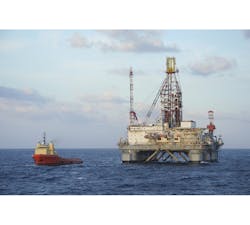The first bi-national study examining the legal issues involved with exploring and exploiting transboundary offshore oil and gas deposits in the Gulf of Mexico will be published this summer in The Houston Journal of International Law, according to Texas A&M University-Corpus Christi.
Dr. Richard McLaughlin, Endowed Chair for Marine Policy and Law at the Harte Research Institute for Gulf of Mexico Studies at Texas A&M University-Corpus Christi and Guillermo J. Garcia Sánchez, a doctorate candidate at Harvard Law School, have completed the first research study sponsored by the Center for U.S. and Mexican Law, titled “The 2012 Agreement on the Exploitation of Transboundary Hydrocarbon Resources in the Gulf of Mexico: Conformation of the Rule or Emergence of a New Practice?” A downloadable version of the study is available here.
"There is a maritime boundary between the U.S. and Mexico, and the question we had as a nation is, what do you do when you have these boundary-straddling reservoirs of oil and gas and how do you exploit these resources efficiently and still be in compliance with international laws?" McLaughlin said. "This has become increasingly important as we have discovered oil and gas reserves that very likely cross this boundary."
The study examines current laws and practices in other parts of the world concerning transboundary oil resources, and sees how the current agreement governing these issues — the 2012 U.S.-Mexico Transboundary Resources Agreement — compared. Research found that, generally, it was standard to find the most efficient way to exploit shared oil resources while preserving them as a single unit. However, the current U.S./Mexico policy contains an unusual provision that allows a nation to unilaterally exploit the disputed oil reserve if an agreement isn’t reached.
Because both nations will still need to cooperate and abide by the determinations of jointly selected, unbiased experts, it’s likely that any exploration will conform to established practices, McLaughlin said.
READ ALSO: Global Upstream Oil and Gas Activity Fell by $4.3B In June
Many legal and regulatory issues must be discussed before the two nations can even begin to manage transboundary resources in the Gulf. With Mexico opening up its energy sector to foreign investment, national oil company Pemex will no longer hold a monopoly on energy exploration in Mexico’s Gulf holdings — something unbeknownst when the treaty was written.
McLaughlin said because of these reforms, transboundary oil disputes might not become an immediate issue. Because Mexico has opened waters to foreign investment and energy exploration, it is likely companies will leave the complications and legal uncertainties of transboundary drilling for future investments. Even so, McLaughlin said it is still important to explore these complicated legal issues because of increased interest in deepwater drilling and new energy opportunities in Mexican waters.
"Most of the major finds in recent years have been in deepwater or ultra-deepwater," McLaughlin said. "This is a huge area of the Gulf that has just been discovered in the last 10 years with new technology. We must continue to work to make sure that these agreements and relations between the U.S. and Mexico continue to be effective and comply with international law."


